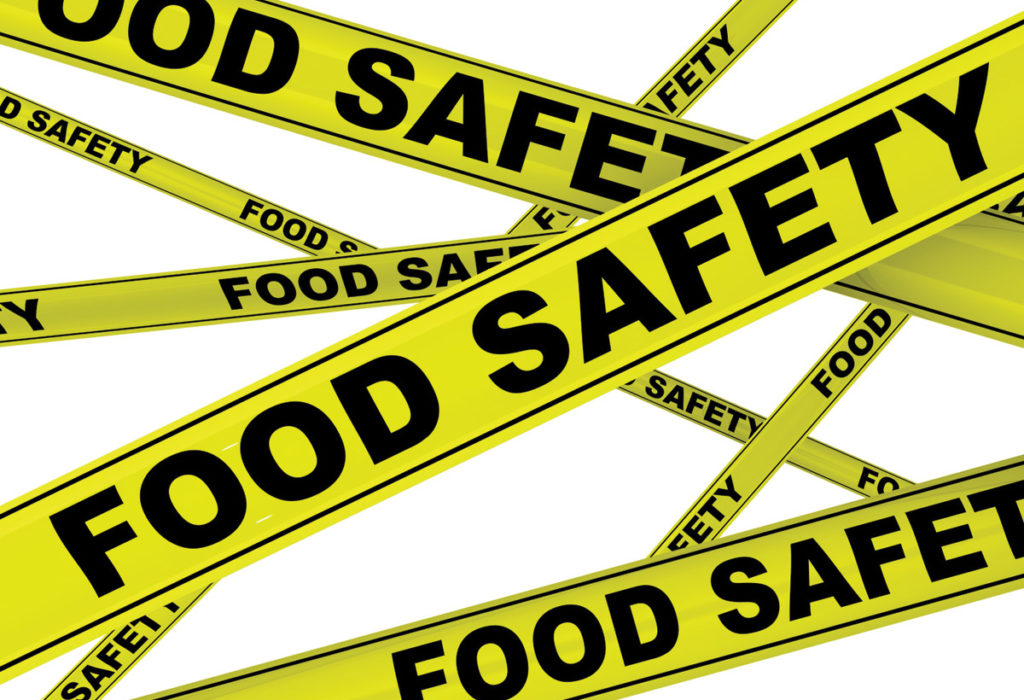
With the media cycling medical updates, new transmission figures, and personal stories of contagion and survival for COVID-19 24/7, we were hoping to bring you some good news this week. Food Contact Surfaces, while striving to provide information on matters relating to food safety, also enjoys incorporating elements of quirkiness and levity along with cutting edge research and up-to-date analysis. Remember our take on the farming of cockroaches and milking of camels? What about the case of the catnoodlers? And who could forget the Schadenfreude we enjoyed with the unfortunate GI effects of tainted Gummi Bears? So in this time of ‘The Great Pause,’ as we’ve seen it termed, we would very much like to be able to offer some light-at-the-end-of-the-tunnel news to relieve the ‘great anxiety.’ Therefore, it is with a certain amount of chagrin that we admit we’re unlikely to provide that relief today, looking – as we are – at the suspension of federal inspections at domestic food processing plants. But forewarned is forearmed and, since we want to protect our readership and our community from threats in all forms, it is incumbent upon us to look at the news from the FDA and at how it impacts your grocery store selections.
As relatively recently as earlier this year, the federal Food and Drug Administration (FDA) had taken what was seen by some as a positive step forward in the protection of public health in relation to the consumption of fresh produce. In collaboration with the Centers for Disease Control and Prevention (CDC), between 2009 and 2018 the agency identified 40 outbreaks of the food-borne pathogen E.coli that had direct or suspected links to leafy greens. Cataloging these outbreaks lead to the formulation of a comprehensive roadmap for an increase in measures to ensure a safe supply of lettuce and other salad leaves. Unveiled in a post on the agency’s blog FDA Voices, the release of the 2020 Leafy Greens STEC Action Plan ‘spells out the actions the FDA plans to take this year in the areas of prevention, response and addressing knowledge gaps.’(1) The acronym STEC stands for ‘Shiga-toxin producing E. coli’ which, as we know, is a particularly virulent pathogen frequently responsible for food-borne illness. Designed with a view to encouraging collaboration between producers, industry leaders, and governmental oversight agencies, the plan emphasized the importance of enhancing prevention, streamlining response, and filling in existing knowledge gaps. Each section of the plan encompassed multiple areas of focus and the actions associated in their regard. For a complete breakdown of the action plan, review the FDA’s link here.
In the light of the current ‘Great Pause,’ however, these new actions have been suspended indefinitely. In a press release just 13 days later, the agency announced its decision to curtail ‘all domestic routine surveillance facility inspections [for] the health and well-being of our staff and those who conduct inspections for the agency under contract at the state level.’(2) This postponing of domestic food processing facility inspections comes after the additional suspension of inspections at ‘most’ foreign facilities, although those classed as critical are assessed on a ‘case-by-case basis.’ As with most companies and agencies, the FDA is pivoting to find alternate ways to perform its role including, it states, ‘evaluating records in lieu of conducting an onsite inspection on an interim basis when travel is not permissible, when appropriate.’(3) Of course, this move is not without precedent. During the government shutdown last year, around 150 inspectors were furloughed in a suspension of inspections according to an article in the New York Times. Although we don’t yet know how many regulatory personnel the current freeze affects, in the 2019 shutdown those 150 monitors were responsible for scrutinizing around 160 manufacturing and processing plants per week, of which a full third were considered to be ‘at high risk of causing food-borne illnesses.’(4) Now, little more than a year later, we can assume that the problem has not decreased in magnitude.
During the previous shutdown, staff at the US Department of Agriculture (USDA) were forced to step in to inspect domestic meat and poultry facilities, albeit without compensation. However this safety fall-back is not available to regulatory authorities given the current situation. Until further notice, whilst remaining ‘committed to using all available tools to oversee the safety and quality of FDA-regulated products for American patients and consumers,’ the FDA has not-so-subtly shifted the burden of responsibility firmly back onto processors and manufacturers. In its aforementioned press release, the agency notes that ‘inspections are just one part of a robust and multi-pronged approach to overseeing the safety and quality of FDA-regulated products, however inspections are not what cause quality to happen. Safety and quality need to be owned by the industry and firms have the primary responsibility to reliably produce quality products.’(5) This primary responsibility must include adherence to Current Good Manufacturing Practice guidelines (cGMPs) and preventative controls such as the following of Hazard Analysis and Critical Control Points protocols (HACCP).
Sound a little risky? Well, there’s more. According to The Hill, an influencer at the intersection of business and politics inside the beltway, the USDA is facing increased pressure regarding its cliff-fall drop in recalls during the months of February, March, and into April this year. In an article dated April 19, 2020, Alex Gangitano writes: ‘Experts noted that the USDA’s Food Safety and Inspection Service has recalled only one product over the last two months. On Feb. 8, a product from Family Traditions Meat Company was recalled due to misbranding. But there were no other recalls until April 10, when the USDA recalled chicken bowls from Conagra Brands over possible foreign matter contamination and pork products from Jowett Farms for missing some inspections. Recalls, though, were flowing in regularly before February, with five in January, four in December, four in November and three in October.’(6)
Just one product recall in two months? And only for misbranding?
We are not the only ones to find this disconcerting. In the same article, Donald Schaffner, Rutgers University Professor of Food Microbiology, admits that he too finds the situation to be baffling: ‘I do think that it is unusual that there were no recalls during that time frame […] COVID-19 has been a distraction [but the pandemic] has probably not directly impacted food safety yet.’(7)
Yet.
So, we are now in a situation where the FDA is unable to work as normal for reasons of COVID-19/shelter-in-place/social distancing/employee safety. The USDA appears to have had a temporary moratorium on product recalls. And the regulatory oversight bodies concerned with ensuring the safety in our food supplies are proposing industry self-regulation. But – and this is a rhetorical question – has self-regulation ever been the best way forward when profit is the bottom line and stakeholders demand satisfaction from quarterly reports? Is there not a danger of putting the fox in charge of the hen house? Or perhaps, in our case right now, the more appropriate comparative fable is that of the big bad wolf and the three little pigs. Let’s turn, for a moment, back to China.
In 2013, Hong Kong-based Shuanghui International Holdings Limited partnered with Virginia-based Smithfield Foods, with an eye to increasing Chinese domestic consumption of pork. Falsely reported as a take-over, the partnership has recently spawned online criticism that pigs are being raised in the US, shipped to China for slaughter and processing, and returned. Clearly, this would be not only a nightmare for the animals involved but also a potential risk for the consumer. The claims have circulated on social media following the shuttering of Smithfield’s South Dakota processing facility ‘after 238 Smithfield employees accounted for about half of Minnehaha County’s 438 COVID-19 cases.’(8) And comments by Smithfield’s own President and CEO Kenneth Sullivan may have added virtual fuel to the online fire when he noted: ‘The closure of this facility, combined with a growing list of other protein plants have shuttered across our industry, is pushing our country perilously close to the edge in terms of our meat supply.’(9)
However, in the ‘factcheck’ article published in USA Today, the company stated that it ‘has not, does not, and will not import any products from China to the United States. No Smithfield products come from animals raised, processed or packaged in China.’(10) In a period of self-regulation, we’ll have to take Smithfield at its word…
With all of that said, we should just point out that in terms of the pandemic, our food – when we can actually get it – is not considered a vector of transmission. Let’s take as our basis the current position of the World Health Authority (WHO): ‘Through the International Food Safety Authorities Network (INFOSAN), national food safety authorities are seeking more information on the potential for persistence of SARS-CoV-2, which causes COVID-19, on foods traded internationally as well as the potential role of food in the transmission of the virus. Currently, there are investigations conducted to evaluate the viability and survival time of SARS-CoV-2.’(11) So, as long as we continue to ensure our own handling of foods follows best practices to avoid contamination, we should be safe from sickness.
Perhaps this is the light-at-the-end-of-the-tunnel news we alluded to at the top of the article? It’s a faint light, but it is, at least, visible. Right now, we’ll take that.
Your thoughts? Are you surprised by the FDA’s move to suspend domestic food processing facilities? Or did you see this coming? We’d love to know!
References:
- https://www.fda.gov/news-events/fda-voices-perspectives-fda-leadership-and-experts/fda-outlines-2020-action-plan-help-advance-safety-leafy-greens
- https://www.fda.gov/news-events/press-announcements/coronavirus-covid-19-update-fda-focuses-safety-regulated-products-while-scaling-back-domestic
- ibid
- https://www.nytimes.com/2019/01/09/health/shutdown-fda-food-inspections.html
- https://www.fda.gov/news-events/press-announcements/coronavirus-covid-19-update-fda-focuses-safety-regulated-products-while-scaling-back-domestic
- https://thehill.com/business-a-lobbying/business-a-lobbying/493423-usda-under-pressure-as-food-safety-concerns-grow
- ibid
- https://www.usatoday.com/story/news/factcheck/2020/04/14/fact-check-smithfield-owned-chinese-firm-sells-us-processed-meat/2987004001/
- ibid
- ibid
- https://www.who.int/docs/default-source/coronaviruse/situation-reports/20200221-sitrep-32-covid-19.pdf

